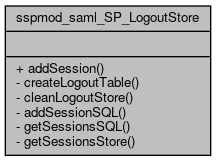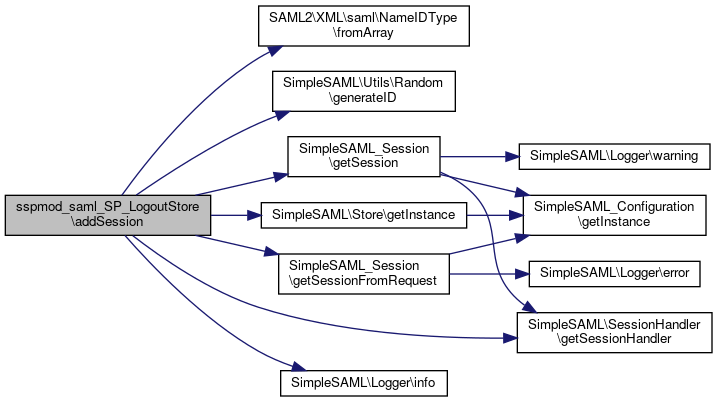 Collaboration diagram for sspmod_saml_SP_LogoutStore:
Collaboration diagram for sspmod_saml_SP_LogoutStore:Static Public Member Functions | |
| static | addSession ($authId, $nameId, $sessionIndex, $expire) |
| Register a new session in the datastore. More... | |
Static Private Member Functions | |
| static | createLogoutTable (\SimpleSAML\Store\SQL $store) |
| Create logout table in SQL, if it is missing. More... | |
| static | cleanLogoutStore (\SimpleSAML\Store\SQL $store) |
| Clean the logout table of expired entries. More... | |
| static | addSessionSQL (\SimpleSAML\Store\SQL $store, $authId, $nameId, $sessionIndex, $expire, $sessionId) |
| Register a session in the SQL datastore. More... | |
| static | getSessionsSQL (\SimpleSAML\Store\SQL $store, $authId, $nameId) |
| Retrieve sessions from the SQL datastore. More... | |
| static | getSessionsStore (\SimpleSAML\Store $store, $authId, $nameId, array $sessionIndexes) |
| Retrieve all session IDs from a key-value store. More... | |
Detailed Description
Definition at line 8 of file LogoutStore.php.
Member Function Documentation
◆ addSession()
|
static |
Register a new session in the datastore.
Please observe the change of the signature in this method. Previously, the second parameter ($nameId) was forced to be an array. However, it has no type restriction now, and the documentation states it must be a \SAML2\XML\saml\NameID object. Currently, this function still accepts an array passed as $nameId, and will silently convert it to a \SAML2\XML\saml\NameID object. This is done to keep backwards-compatibility, though will no longer be possible in the future as the $nameId parameter will be required to be an object.
- Parameters
-
string $authId The authsource ID. \SAML2\XML\saml\NameID $nameId The NameID of the user. string | NULL $sessionIndex The SessionIndex of the user.
Definition at line 177 of file LogoutStore.php.
References $expire, $nameId, $session, $sessionIndex, $store, addSessionSQL(), SAML2\XML\saml\NameIDType\fromArray(), SimpleSAML\Utils\Random\generateID(), SimpleSAML\Store\getInstance(), and SimpleSAML_Session\getSessionFromRequest().
 Here is the call graph for this function:
Here is the call graph for this function:◆ addSessionSQL()
|
staticprivate |
Register a session in the SQL datastore.
- Parameters
-
\SimpleSAML\Store\SQL $store The datastore. string $authId The authsource ID. string $nameId The hash of the users NameID. string $sessionIndex The SessionIndex of the user.
Definition at line 78 of file LogoutStore.php.
References $data, $expire, $nameId, $sessionIndex, $store, cleanLogoutStore(), and createLogoutTable().
Referenced by addSession().
 Here is the call graph for this function:
Here is the call graph for this function: Here is the caller graph for this function:
Here is the caller graph for this function:◆ cleanLogoutStore()
|
staticprivate |
Clean the logout table of expired entries.
- Parameters
-
\SimpleSAML\Store\SQL $store The datastore.
Definition at line 58 of file LogoutStore.php.
References $params, $query, $store, and SimpleSAML\Logger\debug().
Referenced by addSessionSQL().
 Here is the call graph for this function:
Here is the call graph for this function: Here is the caller graph for this function:
Here is the caller graph for this function:◆ createLogoutTable()
|
staticprivate |
Create logout table in SQL, if it is missing.
- Parameters
-
\SimpleSAML\Store\SQL $store The datastore.
Definition at line 15 of file LogoutStore.php.
References $query, $ret, $store, and SimpleSAML\Logger\warning().
Referenced by addSessionSQL(), and getSessionsSQL().
 Here is the call graph for this function:
Here is the call graph for this function: Here is the caller graph for this function:
Here is the caller graph for this function:◆ getSessionsSQL()
|
staticprivate |
Retrieve sessions from the SQL datastore.
- Parameters
-
\SimpleSAML\Store\SQL $store The datastore. string $authId The authsource ID. string $nameId The hash of the users NameID.
- Returns
- array Associative array of SessionIndex => SessionId.
Definition at line 110 of file LogoutStore.php.
References $nameId, $params, $query, $res, $row, $store, and createLogoutTable().
 Here is the call graph for this function:
Here is the call graph for this function:◆ getSessionsStore()
|
staticprivate |
Retrieve all session IDs from a key-value store.
- Parameters
-
\SimpleSAML\Store $store The datastore. string $authId The authsource ID. string $nameId The hash of the users NameID. array $sessionIndexes The session indexes.
- Returns
- array Associative array of SessionIndex => SessionId.
Definition at line 146 of file LogoutStore.php.
References $nameId, $res, $sessionIndex, and $store.
The documentation for this class was generated from the following file:
- libs/composer/vendor/simplesamlphp/simplesamlphp/modules/saml/lib/SP/LogoutStore.php









